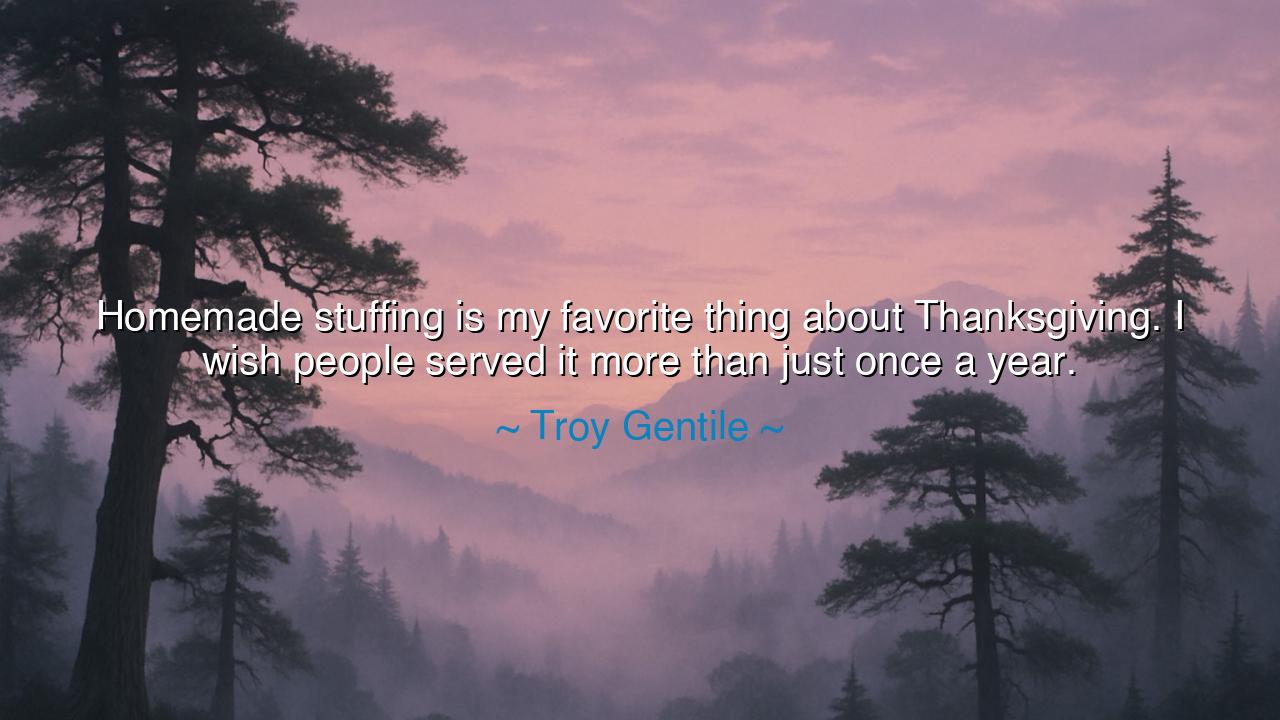
Homemade stuffing is my favorite thing about Thanksgiving. I
Homemade stuffing is my favorite thing about Thanksgiving. I wish people served it more than just once a year.






In the simple and heartfelt words of Troy Gentile, we find more than a comment about food; we uncover a longing for tradition, memory, and the small joys that bind life together: “Homemade stuffing is my favorite thing about Thanksgiving. I wish people served it more than just once a year.” Though he speaks of bread and herbs baked within the bird, he points to something greater—the desire that what nourishes us most should not be confined to a single day, but woven into the rhythm of daily life.
The mention of stuffing is not trivial. For in its making are the hallmarks of family and memory. It is not purchased ready-made but crafted by hand, bread cut and seasoned, broth poured, and flavors mingled slowly, just as generations mingle around the table. To call this dish his favorite is to honor not merely the food itself, but the love, time, and togetherness that give it meaning. Homemade stuffing is not only sustenance—it is heritage.
In ancient days, feasts too were marked by special dishes, foods prepared only for the sacred times. Among the Hebrews, the unleavened bread of Passover was eaten but once a year, yet it carried the story of deliverance in every bite. Among the Greeks, honey-cakes and roasted lamb were brought forth in festivals to honor the gods, and these were not for every day but for holy moments. So too with Thanksgiving stuffing—it is rare, not because it is difficult, but because its power lies in its association with gathering, gratitude, and the solemnity of the feast.
Yet Gentile’s longing—“I wish people served it more than just once a year”—reveals the human hunger for continuity. Why should joy be confined to rare occasions? Why should gratitude and fellowship be reserved for a single Thursday in November? His words remind us that the spirit of Thanksgiving ought not to be caged by the calendar, but carried into daily living. If stuffing is the symbol of warmth, tradition, and togetherness, then why should it not bless our tables more often?
History shows us what happens when sacred things are confined too narrowly. Consider the Romans, who kept their festivals but lived the rest of the year in pursuit of conquest and gain. Their society grew wealthy but hollow, because they forgot to carry the spirit of their holy days into daily life. By contrast, in monastic communities of the Middle Ages, every meal, however simple, was treated with reverence, prayers of gratitude rising not only on feast days but every day. For them, the feast was a way of life, not an exception.
The lesson here is clear: do not save your best for rare occasions only. If homemade stuffing is love and warmth on a plate, then find ways to bring its spirit into ordinary days. Share a meal with family often, not just on holidays. Create small rituals that remind you of gratitude and connection. Let every dinner table be, in some measure, a feast of thanksgiving, even if it holds no turkey or pie. For the true treasure is not the dish itself, but the love and memory it carries.
Practical wisdom flows from this truth. Prepare foods that remind you of family more often. Invite others to your table not just once a year, but whenever you can. Let gratitude be spoken at meals, even on ordinary nights. And above all, remember that joy, like stuffing, is best when shared, passed around from hand to hand, filling not only the belly but the heart.
Thus, in the voice of Troy Gentile, we hear an ancient call disguised in modern humor: that life’s sweetest things should not be confined to one day. The feast of Thanksgiving is holy, but its spirit belongs to all seasons. To take the warmth of stuffing, the laughter of the table, and the gratitude of the heart, and to carry them into daily life—this is to make every day a banquet of love.






AAdministratorAdministrator
Welcome, honored guests. Please leave a comment, we will respond soon